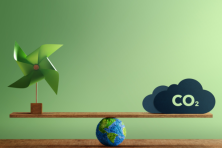What a historic year 2023 has been for climate action in Washington! The transformational Climate Commitment Act went into effect in January, creating the nation's second economy-wide program to cap emissions and invest in clean energy solutions to the climate crisis. In its first year alone, the program has brought in a record $2.2 billion to invest in protections for climate, clean air, and clean water that will directly benefit communities.
For the first time ever, we are holding major polluters accountable for the harm they’ve caused to our air, lands, health, and communities, and we now have a dedicated funding source for decades to come to accelerate our transition away from harmful fossil fuels.
The cap-and-invest program is still in its infancy, and the majority of the health, cost, and climate benefits we will receive from its clean energy investments are on the brink of unfolding. But as the sun sets on 2023 and legislators gear up to invest additional Climate Commitment Act dollars in the 2024 supplemental budget, here is a snapshot of the program’s first year, the benefits soon to come, and what’s on the horizon for this landmark law.
The Climate Commitment Act is working as intended, with prices following a predictable trend comparable to other programs.
As we’ve highlighted above, the state generated $2 billion through the sale of pollution permits (“allowances”) in quarterly auctions.
At each auction, the state’s major polluters purchased allowances to cover every single metric ton of carbon they emit. The price per allowance this year stayed within a relatively predictable range, starting out at $48.50 and gradually increasing until it peaked at $63.03 at the third auction, and settling back down to $51.89 in the final auction of the year.
These price trends have mirrored both California’s cap-and-trade program and the Regional Greenhouse Gas Initiative (RGGI) on the east coast, where prices peaked in the third auction of all three programs. Experts say that this peak is largely due to the uncertainty that comes with a new program, and businesses’ high demand for allowances as they learn how to comply with a new law. It is clear that businesses’ confidence in the market has increased as the program continues to develop.
The Climate Commitment Act has generated billions of dollars of investments to protect our air, water, and forests in WA communities, and will continue to do so for decades to come.
The revenues raised from the sale of pollution permits are going to on-the-ground solutions to create more resilient and healthy communities. Currently, agency staff are working hard to roll out many of the new programs already funded through the CCA in the 2023 legislative session to get this money directly into communities. These include:
- $80 million for a program that will help low- and moderate-income households transition off of fossil fuels to adopt heat pumps that provide efficient heating and cooling in their homes;
- $120 million for a program to clean up the dirtiest vehicles on the road, including gas-fueled trucks, buses, and delivery vans, and improve air quality in Washington’s overburdened communities; and
- $50 million for two new innovative grant programs to fund community-led solutions to air pollution and to reduce the disproportionate impacts of climate change in overburdened communities.
As additional CCA revenue flows into the state, investing these dollars in community-driven solutions will remain a top priority for the Legislature. In 2024, we’re already eyeing additional funding to electrify school buses and protect the health of children, drivers and communities, and to invest in multifamily housing efficiency and electrification to ensure all Washingtonians have access to healthy and resilient homes. Keep your eye out for a deep-dive on these priorities and more for the upcoming legislative session!
More opportunities to come in 2024: merging with California and Quebec’s joint carbon market, improving air quality in overburdened communities, and investing federal dollars.
Merging our market with the California-Quebec market could result in cost savings and opportunities for lower cost carbon reduction opportunities. But conversations around whether—and the conditions under which—Washington joins California and Quebec’s carbon market will pick up in 2024, and could have major impacts on our program(s). The Department of Ecology has a critical opportunity and an obligation to make sure that linking with California-Quebec will benefit all three jurisdictions’ communities by increasing program ambition – especially in California, which currently has weaker pollution reduction requirements – and improving environmental justice outcomes. If Washington meets these obligations, joining the California-Quebec program has the potential to deliver cost savings, program efficiency and stability, and greater overall protections for climate and air pollution.
Other exciting developments coming in 2024 also include an expansion of air quality monitoring in overburdened communities, a rulemaking process to enforce stricter air quality standards on heavy polluters in the state, and a more coordinated effort by the state to leverage the billions of federal dollars available to accelerate CCA-funded climate action.
It has been an exciting first year of this landmark law, and the tremendous potential it has to improve the daily lives of Washington residents is clear. As state agencies and the legislature continue to make decisions on how the revenue will be spent and what specific solutions to invest in, we’ll be keeping a close eye and will keep you updated.





